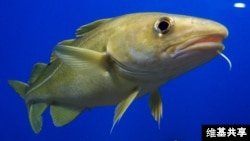Rapidly warming waters in the Gulf of Maine are making it difficult for the cod population to rebound from fishing, according to a new study.
Writing in Science magazine, researchers from the Gulf of Maine Research Institute say changes in the position of the Gulf Stream and climate variances in the Atlantic and Pacific oceans are teaming up with global climate change to push cod stocks to the "verge of collapse."
Cod is a cold-water fish, and its population is only around 3 to 4 percent of sustainable levels. Even restrictions on fishing have yet to lead to a rebound.
"Managers kept reducing quotas, but the cod population kept declining," said Andrew Pershing, the institute’s chief scientific officer and the study’s lead author. "It turns out that warming waters were making the Gulf of Maine less hospitable for cod, and the management response was too slow to keep up with the changes."
The gulf lies at the edge of the fish’s natural geographical range. Researchers said the warming waters have reduced the number of offspring from spawning females and has decreased the survivability rate of young fish. Pershing said that from 2004 to 2013, "the Gulf of Maine had warmed faster than 99.9 percent of the global ocean."
Quotas based on flawed models
Quotas to reduce overall fishing catches haven’t helped, because they were based on models that did not take rising water temperatures into account.
"This creates a frustrating situation that contributes to mistrust between fishermen, scientists and managers," said Pershing. "The first step toward adapting fisheries to a changing climate is recognizing that warming impacts fish populations."
The U.S. researchers said their study shows the importance of factoring in temperatures when making fishery models.
The northern cod population off the Canadian provinces of Newfoundland and Labrador had gone into a disastrous decline several decades ago, and in 1992 the federal government imposed a moratorium on fishing along the country’s east coast.
Good news from farther north
Better news arrived earlier this week: The cod populations along the Canadian coast have increased significantly since the moratorium. George Rose, head of the Fisheries Conservation Group, said acoustic surveys last spring indicated that the fish were getting bigger and more plentiful.
The research, published Tuesday in the Canadian Journal of Fisheries and Aquatic Sciences, suggests the cod is rebounding because of a similar rise in the availability of its key food source, capelin.
"If this stock can recover," Rose said, "there exists the same potential for other depleted stocks worldwide."





